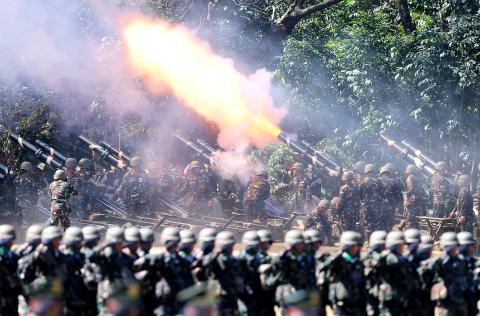The Philippines has agreed to allow the US access to its military bases under a new security deal being negotiated by the two allies, amid mounting concern over China’s increasing assertiveness in the disputed waters of the South China Sea.
The offer was made during a sixth round of talks held in Washington last week, Filipino officials said yesterday. The two sides hope to finalize terms before US President Barack Obama embarks on a visit to Asia, including the Philippines, next month.
“Consensus was arrived at on many provisions of the draft agreement,” Philippine Undersecretary for Defense Pio Lorenzo Batino told a news conference, adding that the deal is 80 percent done.

Photo: EPA
“The proposed agreement will allow the sharing of defined areas within certain AFP [Armed Forces of the Philippines] facilities with elements of the US military,” he said.
The US plans to “rebalance” its forces in the Asia-Pacific region, and has similar arrangements with Australia and Singapore as part of its strategy to counter China.
The new agreement on enhanced defense cooperation will allow the US increased deployment of troops, ships, aircraft and humanitarian equipment.
US military access in the Philippines is currently limited to during annual joint-exercises and port visits.
Manila would welcome the return of a US military presence to deter China’s ambitions in the South China Sea and to help provide humanitarian assistance during natural disasters.
“It will not stop China from its bullying tactics, but it will become more cautious and might exercise self-restraint due to the US presence,” said Rommel Banlaoi, an analyst at Philippine Institute of Peace, Violence and Terrorism Research.
“The Philippines will also benefit from more exercises and more assistance from the US, and it will elevate the Philippines to a major non-NATO ally in the Pacific,” he added.
Friction between China and the Philippines, and other states in the region, over disputed territories in the South China Sea has increased since last year, despite diplomatic efforts to forge an agreement on maritime conduct.
The dispute revolves round competing claims over the Spratly Islands (南沙群島), a group of 250 islets known as the Nansha Islands in Taiwan.
On Sunday, three Chinese coast guard ships stopped two Filipino civilian vessels from delivering food, water and construction materials to troops based on a ship that was deliberately run aground on a reef in the Spratlys in 1999 to reinforce the Philippines’ claim.
Manila called the Chinese actions “a clear and urgent threat to the rights and interests of the Philippines.”
Under the draft accord, the Philippines will allow US forces joint use of facilities in several military bases like Manila, Clark, Palawan, Cebu, Nueva Ecija and La Union, a military official with knowledge of the negotiations said.
Manila refused a request for use of civilian airfields and ports, like Subic Freeport Bay, and Laoag and Davao international airports, according to the military official.
Batino said the agreement would be legally binding, but would not require ratification by the Philippine Senate, which could delay the actual US deployment.

NATIONAL SECURITY THREAT: An official said that Guan Guan’s comments had gone beyond the threshold of free speech, as she advocated for the destruction of the ROC China-born media influencer Guan Guan’s (關關) residency permit has been revoked for repeatedly posting pro-China content that threatens national security, the National Immigration Agency said yesterday. Guan Guan has said many controversial things in her videos posted to Douyin (抖音), including “the red flag will soon be painted all over Taiwan” and “Taiwan is an inseparable part of China,” while expressing hope for expedited “reunification.” The agency received multiple reports alleging that Guan Guan had advocated for armed reunification last year. After investigating, the agency last month issued a notice requiring her to appear and account for her actions. Guan Guan appeared as required,

A strong cold air mass is expected to arrive tonight, bringing a change in weather and a drop in temperature, the Central Weather Administration (CWA) said. The coldest time would be early on Thursday morning, with temperatures in some areas dipping as low as 8°C, it said. Daytime highs yesterday were 22°C to 24°C in northern and eastern Taiwan, and about 25°C to 28°C in the central and southern regions, it said. However, nighttime lows would dip to about 15°C to 16°C in central and northern Taiwan as well as the northeast, and 17°C to 19°C elsewhere, it said. Tropical Storm Nokaen, currently

‘NATO-PLUS’: ‘Our strategic partners in the Indo-Pacific are facing increasing aggression by the Chinese Communist Party,’ US Representative Rob Wittman said The US House of Representatives on Monday released its version of the Consolidated Appropriations Act, which includes US$1.15 billion to support security cooperation with Taiwan. The omnibus act, covering US$1.2 trillion of spending, allocates US$1 billion for the Taiwan Security Cooperation Initiative, as well as US$150 million for the replacement of defense articles and reimbursement of defense services provided to Taiwan. The fund allocations were based on the US National Defense Authorization Act for fiscal 2026 that was passed by the US Congress last month and authorized up to US$1 billion to the US Defense Security Cooperation Agency in support of the

A Vietnamese migrant worker yesterday won NT$12 million (US$379,627) on a Lunar New Year scratch card in Kaohsiung as part of Taiwan Lottery Co’s (台灣彩券) “NT$12 Million Grand Fortune” (1200萬大吉利) game. The man was the first top-prize winner of the new game launched on Jan. 6 to mark the Lunar New Year. Three Vietnamese migrant workers visited a Taiwan Lottery shop on Xinyue Street in Kaohsiung’s Gangshan District (崗山), a store representative said. The player bought multiple tickets and, after winning nothing, held the final lottery ticket in one hand and rubbed the store’s statue of the Maitreya Buddha’s belly with the other,